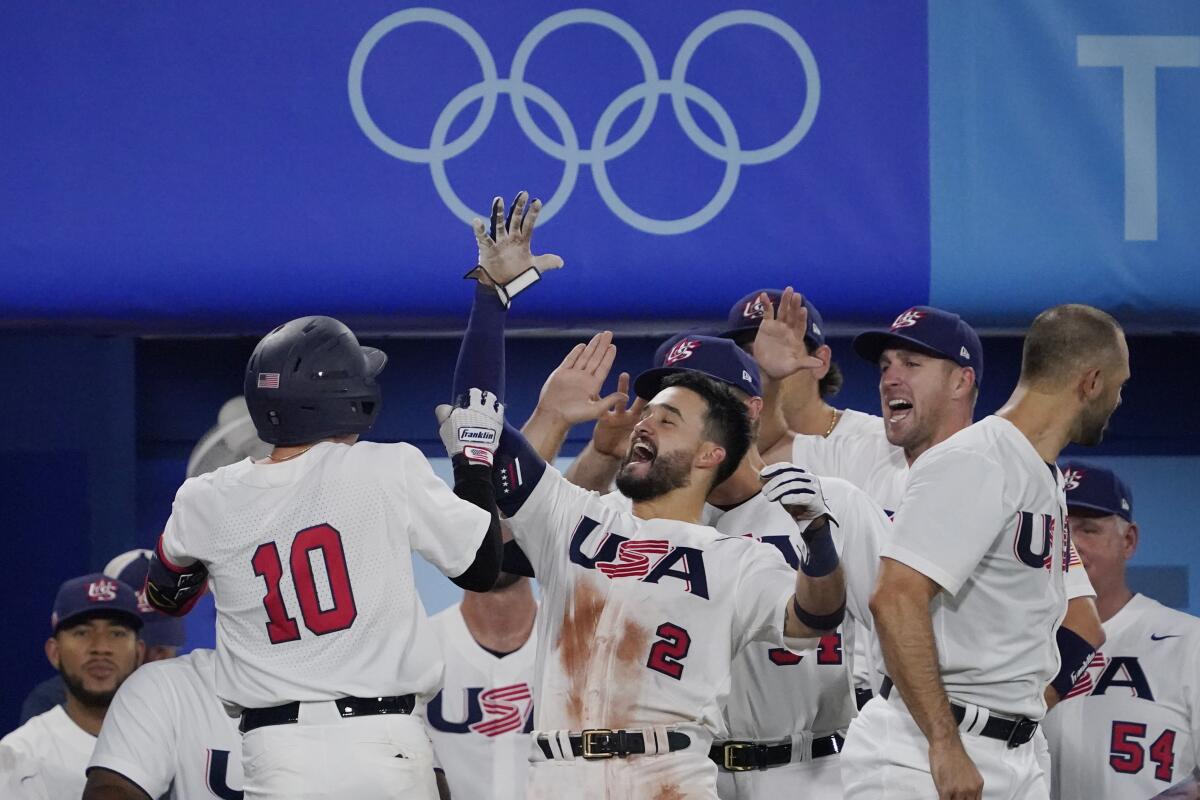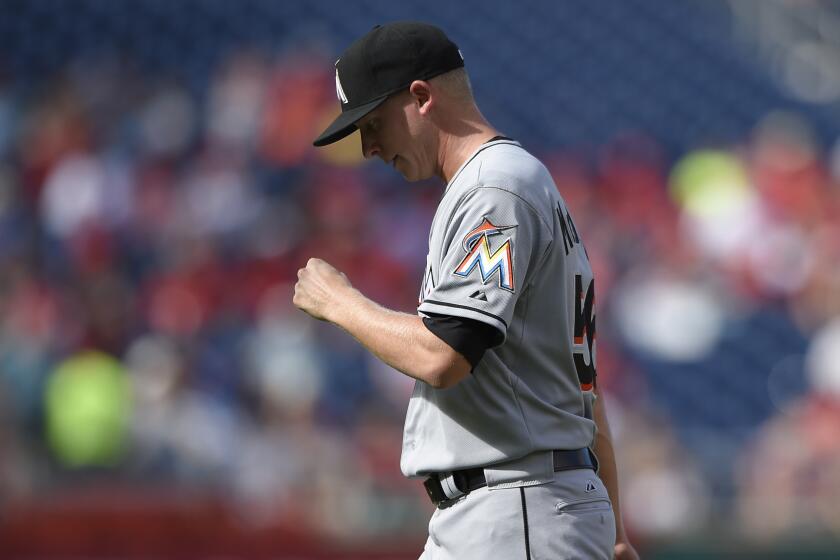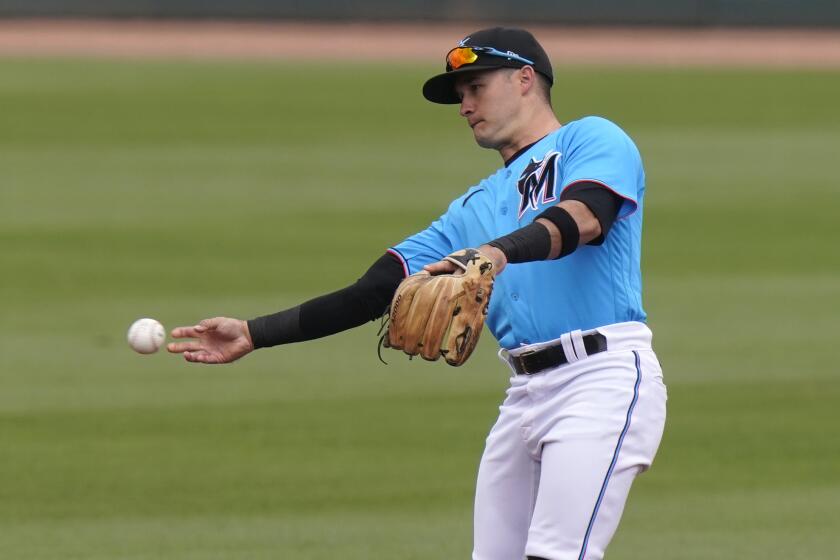Los Angeles could host faster, more exciting style of Olympic baseball in 2028

- Share via
YOKOHAMA — Riccardo Fraccari enjoyed the best view from the crowd at Yokohama Stadium on Saturday, ground level, behind home plate just off to the first-base side, protected by one-way glass. From there, he watched the United States and South Korea play under the lights for first place in Group B of the Olympic baseball tournament.
The vantage point opened the senses. The cracks and the thuds were loud. The emotions were raw. The game was fast. It’s a game Fraccari, an Italian, has loved for most of his life — a passion that pushed him to pursue a career in the sport, first as an umpire, now as the president of the World Baseball Softball Confederation.
And yet he wants the game to change. Not drastically. Not an overhaul. But subtle modifications to modernize America’s previous pastime and render it more digestible for younger people around the world.
The family of U.S. baseball player Scott McGough is in Tokyo, but he still can’t see them. The Olympics make it difficult for families to be together.
With that ethos, Fraccari envisions baseball’s return to the Olympics in Los Angeles in 2028 after it is left off the Paris 2024 Olympic program.
“The world is changing,” Fraccari said. “The youth, they’re asking for something different. So anticipate the changes or we’re going to fold. This is the reality. We cannot stay like 10 years ago. We have to think to offer the sport in different ways than in the past.”
Fraccari’s pursuit parallels Rob Manfred’s mission. The Major League Baseball commissioner has overseen a slow effort to quicken the pace of play and generate more action. Fraccari, however, is not shackled by nostalgia.
He pointed out international baseball has begun pushing the boundaries. Olympic games have a 20-second pitch clock and limit the time between half innings to 90 seconds. Runners are put on first and second base in extra innings. In 2019, the WBSC changed Baseball World Cup games up through U23 to seven innings.
He is open to more adjustments in future Olympics, though seven-inning games are off the table. But the biggest change possible is not related to rules. While Nippon Professional Baseball and the KBO League made all their players available for the Olympic tournament, MLB remains a holdout.
Judo coach Yosh Uchida continues to affect the lives of Olympians at 101. One of his pupils, Colton Brown, is competing at the Tokyo Olympics.
Last February, it was reported that MLB would allow players on 40-man rosters but not in the majors to participate in the Tokyo Olympics. That changed when the COVID-19 pandemic delayed the Games one year. Players on 40-man rosters were ultimately not allowed. MLB has said the timing of the Games creates an inherent challenge. Fraccari didn’t rule out the possibility of major leaguers playing in the L.A. Games.
“The IOC wants the top of the top in the Olympics,” Fraccari said. “I think that it’s too early [to say], but I think we’re having the right discussions. I think it’s possible.”
The United States would benefit most from adding major leaguers to the Olympic player pool. U.S. manager Mike Scioscia, who managed the Angels for 19 seasons until 2018, said he believes major leaguers will remain limited to the World Baseball Classic, a tournament held every four years during spring training.
“I don’t believe baseball, right now, has any way they could shut down the major leagues for two or three weeks and then be able to pick it right back up,” Scioscia said. “That would be a very, very difficult proposition.”
Eddy Alvarez won a silver medal as a speedskater at the Sochi Olympics in 2014. He’s back in the Olympics representing the U.S. as a baseball player.
With or without major leaguers, Fraccari said his long-term goal is to make baseball and softball — a package deal for the Olympics — a staple in the quadrennial sports festival. The two sports hadn’t been included in the Games since Beijing 2008. Fraccari believes the sport’s international progress — Shohei Ohtani’s two-way dominance in the majors, Israel qualifying for the Olympics, Latin America’s continued success — has helped convince the International Olympic Committee of its viability as a global sport.
“I think we have broken the mentality and perception that baseball is only an American sport,” Fraccari said. “They understood.”
For now, baseball and softball will have to wait seven years for their next Olympic appearance after Saturday’s baseball gold medal game. It’ll return to Los Angeles very different than it looked when the city last hosted the Olympics in 1984.
It was just a demonstration sport back then, eight years away from joining the Olympic program in Barcelona. The 16-game exhibition tournament at Dodger Stadium ended with Japan beating the U.S. 6-3 in the final. Attendance for the games averaged more than 48,000. People wanted baseball. Fraccari was there calling balls and strikes as the home-plate umpire with the best view in the park.
More to Read
Go beyond the scoreboard
Get the latest on L.A.'s teams in the daily Sports Report newsletter.
You may occasionally receive promotional content from the Los Angeles Times.









